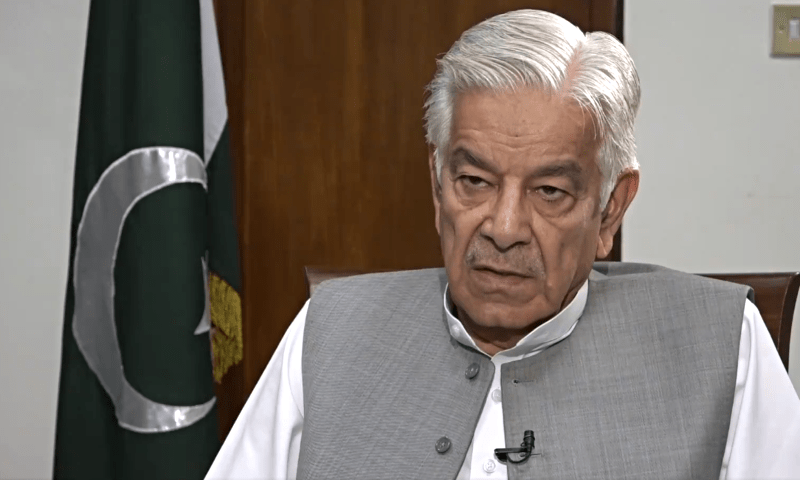ISLAMABAD: Amid a surge in terror incidents, which Pakistan attributes to the leadership of the banned Tehreek-i-Taliban Pakistan (TTP) hiding in Afghanistan, Defence Minister Khawaja Asif on Thursday hinted at the possibility of cross-border strikes to eliminate militant hideouts in the neighboring country.
The defence minister’s statement comes a day after the Maulana Fazlur Rehman’s statement about the critical security situation in Khyber Pakhtunkhwa. The JUI-F chief highlighted that the situation had deteriorated to the point where even the police could not patrol at night due to the presence of armed men.
In an interview with Voice of America, the defence minister stated that Islamabad could strike terror havens in Afghanistan, asserting it would not violate international law since Kabul had been “exporting” terrorism to Pakistan, and the “exporters” were being harbored there.
He acknowledged that while the TTP operated from the neighboring country, its cadre, numbering a few thousand, were also operating from within Pakistan. He blamed the PTI government for allowing these militants to return.
The minister ruled out any possibility of dialogue with the banned outfit, citing a lack of common ground.
Discussing ‘Azm-i-Istehkam’, he assured that parliament would be consulted, and the concerns of political parties would be addressed. He also criticized civilians for failing to capitalize on the successes of past military operations.
In a separate statement to Geo News, the minister emphasized that Islamabad would “stringently enforce international laws at its borders with Afghanistan” to restrict the movement of smuggled goods. He mentioned that this measure would also “thwart the infiltration of terrorists”.
“All traffic from Afghanistan will only be allowed entry into Pakistan with a valid passport and visa,” he stated.
Fazl Opposes Operation
While the government expressed its intent to adopt a tough stance against Afghanistan, Maulana Fazlur Rehman compared the situation to Iran, noting that issues with Iran were resolved within a week through mutual air strikes.
Addressing a press conference at his party’s provincial headquarters after a grand tribal jirga, the JUI-F leader criticized Islamabad for making decisions about Kabul based on anger and emotions. He stressed that issues between states could not be resolved hastily or through threats, as it would only worsen bilateral relations. “When people questioned the establishment over the law and order situation, they simply shifted the blame to Afghanistan,” he claimed.
Speaking about the situation in Khyber Pakhtunkhwa, he noted that there were more militants in certain regions than before. According to the Maulana, “The jirga expressed its lack of trust in the operation and declared that this was not Azm-i-Istehkam, but rather Adam-i-Istehkam (instability).”
The JUI-F chief described how these armed men controlled traffic, set up roadblocks, and collected tolls from motorists. He added that police in the southern districts of the province were besieged in police stations after dusk, unable to perform their duties outside at night.
The Maulana emphasized that the people of KP, from Waziristan to Swat, had made significant sacrifices and suffered displacement due to military operations. He noted that those returning home found nothing left.
“About a year and a half ago, the government issued tokens worth Rs400,000 for destroyed houses and Rs160,000 for partially damaged houses to tribesmen, but the affected people have yet to receive any money,” he said.


